现在分词作状语的分类(伴随、让步、条件、时间等等)
现在分词作状语的分类(伴随、让步、条件、时间等等)
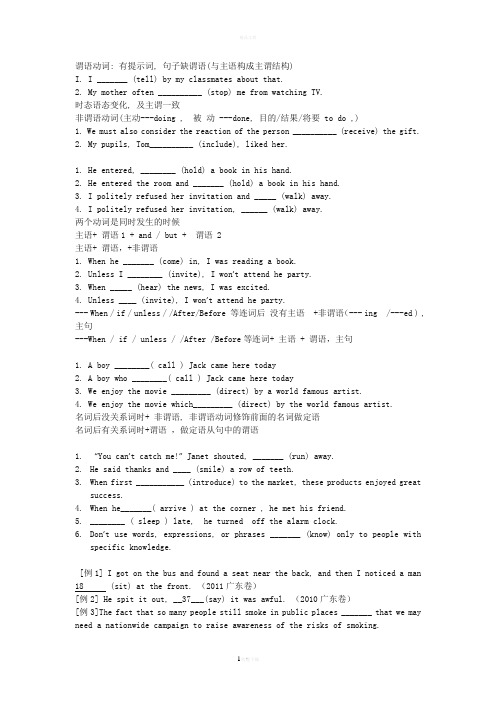
谓语动词: 有提示词, 句子缺谓语(与主语构成主谓结构)I. I _______ (tell) by my classmates about that.2. My mother often __________ (stop) me from watching TV.时态语态变化, 及主谓一致非谓语动词(主动---doing , 被动 ---done, 目的/结果/将要 to do ,)1. We must also consider the reaction of the person __________ (receive) the gift.2. My pupils, Tom__________ (include), liked her.1. He entered, ________ (hold) a book in his hand.2. He entered the room and _______ (hold) a book in his hand.3. I politely refused her invitation and _____ (walk) away.4. I politely refused her invitation, ______ (walk) away.两个动词是同时发生的时候主语+ 谓语1 + and / but + 谓语 2主语+ 谓语,+非谓语1. When he _______ (come) in, I was reading a book.2. Unless I ________ (invite), I won’t attend he party.3. When _____ (hear) the news, I was excited.4. Unless ____ (invite), I won’t attend he party.--- When / if / unless / /After/Before 等连词后没有主语 +非谓语(--- ing /---ed ) , 主句---When / if / unless / /After /Before等连词+ 主语 + 谓语,主句1. A boy ________( call ) Jack came here today2. A boy who ________( call ) Jack came here today3. We enjoy the movie _________ (direct) by a world famous artist.4. We enjoy the movie which_________ (direct) by the world famous artist.名词后没关系词时+ 非谓语, 非谓语动词修饰前面的名词做定语名词后有关系词时+谓语,做定语从句中的谓语1.“You can’t catch me!” Janet shouted, _______ (run) away.2.He said thanks and ____ (smile) a row of teeth.3.When first ___________ (introduce) to the market, these products enjoyed greatsuccess.4.When he_______( arrive ) at the corner , he met his friend.5.________ ( sleep ) late, he turned off the alarm clock.6.Don’t use words, expressions, or phrases _______ (know) only to people withspecific knowledge.[例1] I got on the bus and found a seat near the back, and then I noticed a man 18 (sit) at the front. (2011广东卷)[例2] He spit it out, __37___(say) it was awful. (2010广东卷)[例3]The fact that so many people still smoke in public places _______ that we may need a nationwide campaign to raise awareness of the risks of smoking.A. suggestB. suggestsC. suggestedD. suggestingturn1. If you _____to the left, you'll find the post office.2. _____ to the left, and you'll find the post office.3. to the left , you'll find the post office .[例4] She wished that he was as easy 32 (please)as her mother,who was always delighted with perfume.(2009广东卷)see(1)_______ from the top of the hill, our house looks like a car.(2)_______ the dog come over, our friend ran away.(3)_______ from the top of a hill, and you’ ll find the city more beautiful. (4)_______ more clearly, they came up and got close to it.1. When ____________ different cultures, we often pay attention only to the differences without noticing the similarities.2.__________ with other top students, you are better.discuss(1)The question _________________now at the meeting is very important.(2)The question ________ at the meeting last week is very important.(3)The question __________________ at the meeting next week is very important.1._____many times, but he still couldn't understand it.2. _____many times, he still couldn't understand it.A. Having been toldB. ToldC. He was toldD. To be told1.He is the best one ______ (do) the job.2.He was considered the first man _______________ (invent) the telephone.动词不定式的动作先于谓语动词的动作而发生用to have done1. in thought, he almost ran into the car in front of him. (lose)2. of playing football, he went back to the classroom. (tire)3. with difficulty, he rushed forward bravely. (face)有些过去分词源于系表结果,分词已经形容词化,相当于形容词be lost in; be interested in; be tired of; be satisfied with ; be excited about; be faced with; be dressed in;be seated1.He hurried to the booking office, only _____________ (tell) that all the ticketshad been sold out.to do表示结果—表示出人预料的情况或结果, 常用only强调。
现在分词作状语的用法
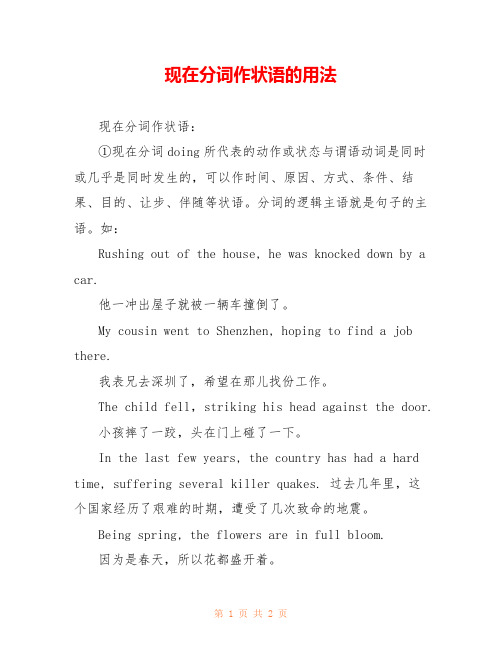
现在分词作状语的用法现在分词作状语:①现在分词doing所代表的动作或状态与谓语动词是同时或几乎是同时发生的,可以作时间、原因、方式、条件、结果、目的、让步、伴随等状语。
分词的逻辑主语就是句子的主语。
如:Rushing out of the house, he was knocked down by a car.他一冲出屋子就被一辆车撞倒了。
My cousin went to Shenzhen, hoping to find a jobthere.我表兄去深圳了,希望在那儿找份工作。
The child fell,striking his head against the door.小孩摔了一跤,头在门上碰了一下。
In the last few years, the country has had a hard time, suffering several killer quakes. 过去几年里,这个国家经历了艰难的时期,遭受了几次致命的地震。
Being spring, the flowers are in full bloom.因为是春天,所以花都盛开着。
②有些分词作状语,没有逻辑上的主语,已成为习惯用法:considering, judging from, talking of, allowingfor(考虑到),generally/frankly/honestly/roughly/strictly speaking, assuming that(假设)等。
如:Talking of this film, its wonderful.说到这部电影,好极了。
Assuming that it is true, what should we do now 假定那是真的, 我们现在该怎麽办Judging by the direction of the wind, it wont rain today.根据风向测度, 今天不会下雨。
2022届高考英语语法精讲精练:现在分词
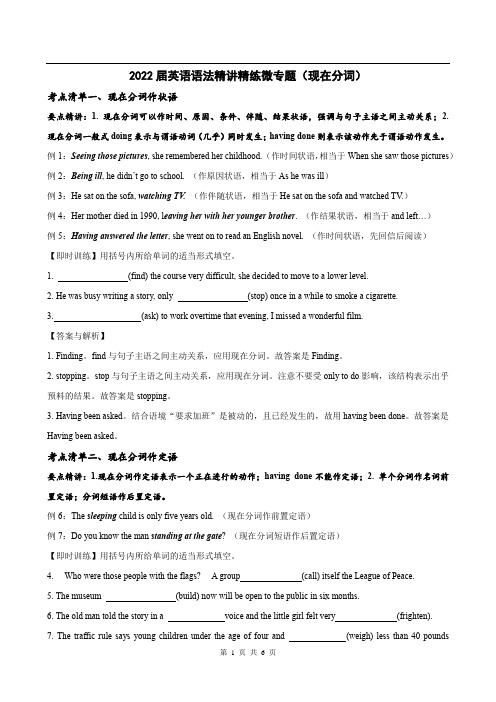
2022届英语语法精讲精练微专题(现在分词)考点清单一、现在分词作状语要点精讲:1. 现在分词可以作时间、原因、条件、伴随、结果状语,强调与句子主语之间主动关系;2.现在分词一般式doing表示与谓语动词(几乎)同时发生;having done则表示该动作先于谓语动作发生。
例1:Seeing those pictures, she remembered her childhood.(作时间状语,相当于When she saw those pictures)例2:Being ill, he didn’t go to school. (作原因状语,相当于As he was ill)例3:He sat on the sofa, watching TV.(作伴随状语,相当于He sat on the sofa and watched TV.)例4:Her mother died in 1990, l eaving her with her younger brother. (作结果状语,相当于and left…)例5:Having answered the letter, she went on to read an English novel. (作时间状语,先回信后阅读)【即时训练】用括号内所给单词的适当形式填空。
1. (find) the course very difficult, she decided to move to a lower level.2. He was busy writing a story, only (stop) once in a while to smoke a cigarette.3. (ask) to work overtime that evening, I missed a wonderful film.【答案与解析】1. Finding。
find与句子主语之间主动关系,应用现在分词。
现在分词作状语

Grammar 2–1. Filling in the blanks.
Complete the sentences with the correct form of the verbs below and rewrite them.
think know sit see leave
1. On_s_e_e_in_g_ her, the king immediately falls in love with her. When the king sees her, he immediately falls in love with her
She picked up the cat and rubbed its head affectionately.
Picking up the cat, she rubbed its head affectionately.
The bear came out of the bushes, showed its teeth and made a lot noise. Showing his teeth and making a loud noise, the bear came out of the bushes.
2) Filling:
Fill in the blanks to finish the following sentences.
Filling:
1. _H_e_a_r_i_n_g_(hear) the sad news, they couldn’t help crying.
2. _B_e_in_g__(be) very angry, she couldn’t go to sleep.
4. European football is played in 80
现在分词作状语的分类(伴随、让步、条件、时间等等)

谓语动词:有提示词,句子缺谓语(与主语构成主谓结构)1.1 ______ (tell) by my classmates about that.2. My mother ofte n ________ (stop) me from watch ing TV.时态语态变化,及主谓一致非谓语动词(主动---doi ng, 被动---do ne, 目的/结果/将要to do ,)1. We must also con sider the react ion of the pers on ___ (receive) the gift.2. My pupils, Tom ________ (in clude), liked her.1. He en tered, _____ (hold) a book in his hand.2. He en tered the room and ____ (hold) a book in his hand.3. I politely refused her in vitatio n and (walk) away.4. I politely refused her in vitatio n, (walk) away.两个动词是同时发生的时候主语+谓语1 + and / but + 谓语2主语+谓语,+非谓语1. When he ________ (come) in, I was readi ng a book.2. Uni ess I ______ (in vite), I won 'atte nd he party.3. When _____ (hear) the n ews, I was excited.4. Uni ess __ (in vite), I won 'atte nd he party.---When/ if / unless / /After/Before 等连词后没有主语 + 非谓语(---ing /---ed ), 主句---Whe n / if / un less / /After /Before 等连词 + 主语 + 谓语,主句1. A boy _______ ( call ) Jack came here today2. A boy who ________ ( call ) Jack came here today3. We enjoy the movie ________ (direct) by a world famous artist.4. We enjoy the movie which ________ (direct) by the world famous artist.名词后没关系词时+非谓语,非谓语动词修饰前面的名词做定语名词后有关系词时+谓语,做定语从句中的谓语1. You can 'catch me! ” Janet shouted, _______ (run) away.2. He said tha nks and __ (smile) a row of teeth.3. When first ___________ (in troduce) to the market, these products enjoyed greatsuccess.4. When he _______ ( arrive ) at the corner , he met his friend.5. ________ ( sleep ) late, he turned off the alarm clock.6. Don 'tuse words, expressi ons, or phrases ___ (know) only to people withspecific kno wledge.[例 1] I got on the bus and found a seat near the back, and then I noticed a man18 _ (sit) at the fro nt. ( 2011 广东卷)[例 2] He spit it out, __37 (say) it was awful. ( 2010 广东卷)[例 3]The fact that so many people still smoke in public places ____________ t hat we mayn eed a n ati on wide campaig n to raise aware ness of the risks of smok ing.A. suggestB. suggestsC. suggestedD.suggest ingturn1. If you ___ to the left, you'll find the post office.2. ____ to the left, and you'll find the post office.3. to the left , you'll find the post office .[例 4] She wished that he wasas easy 32 _____ (please)as her mother ,who was alwaysdelighted with perfume . (2009 广东卷)see(1)_______ from the top of the hill, our house looks like a car.(2)_______ the dog come over, our friend ran away.(3) _______ from the top of a hill, and you ' II find the city more beautiful.(4) _______ more clearly, they came up and got close to it.1. When _____________ different cultures, we often pay attention only to the differences without noticing the similarities.2. _________ with other top stude nts, you are better.discuss(1) ___________________________ The question now at the meeting is very important.(2) ___________________ The question at the meeting last week is very important.(3) _____________________________ The questi on at the meeti ng n ext week is very importa nt.1. ____ many times, but he still could n't understand it.2. ____ many times, he still could n't un dersta nd it.A. Havi ng bee n toldB. ToldC. He was toldD. To be told1. He is the best one ____ (do) the job.2. He was con sidered the first man ______________ (invent) the teleph one.动词不定式的动作先于谓语动词的动作而发生用to have done1. ___ in thought, he almost ran into the car in front of him. (lose)2. ___ of_play ing football, he went back to the classroom. (tire)3. ___ with_difficulty, he rushed forward bravely. (face)有些过去分词源于系表结果,分词已经形容词化,相当于形容词be lost in; be interested in; be tired of; be satisfied with ; be excited about;be faced with; be dressed in ; be seated1. He hurried to the booking office , only ______________ (tell) that all the ticketshad bee n sold out.to do表示结果一表示出人预料的情况或结果,常用only强调。
现在分词做状语 英语
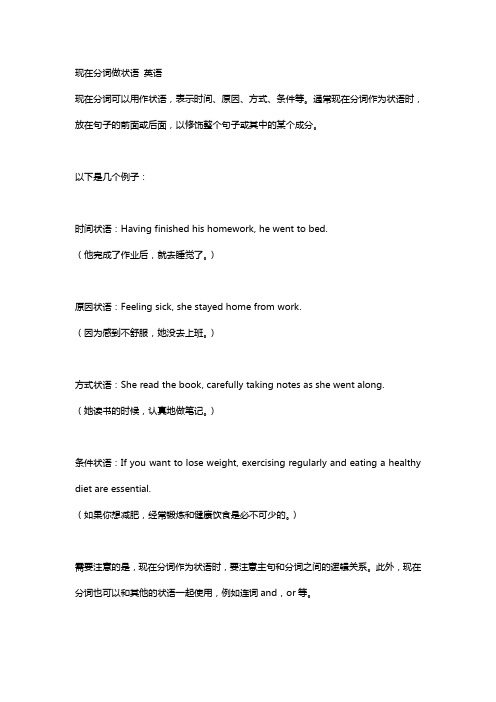
现在分词做状语英语
现在分词可以用作状语,表示时间、原因、方式、条件等。
通常现在分词作为状语时,放在句子的前面或后面,以修饰整个句子或其中的某个成分。
以下是几个例子:
时间状语:Having finished his homework, he went to bed.
(他完成了作业后,就去睡觉了。
)
原因状语:Feeling sick, she stayed home from work.
(因为感到不舒服,她没去上班。
)
方式状语:She read the book, carefully taking notes as she went along.
(她读书的时候,认真地做笔记。
)
条件状语:If you want to lose weight, exercising regularly and eating a healthy diet are essential.
(如果你想减肥,经常锻炼和健康饮食是必不可少的。
)
需要注意的是,现在分词作为状语时,要注意主句和分词之间的逻辑关系。
此外,现在分词也可以和其他的状语一起使用,例如连词and,or等。
现在分词用作状语(九类)
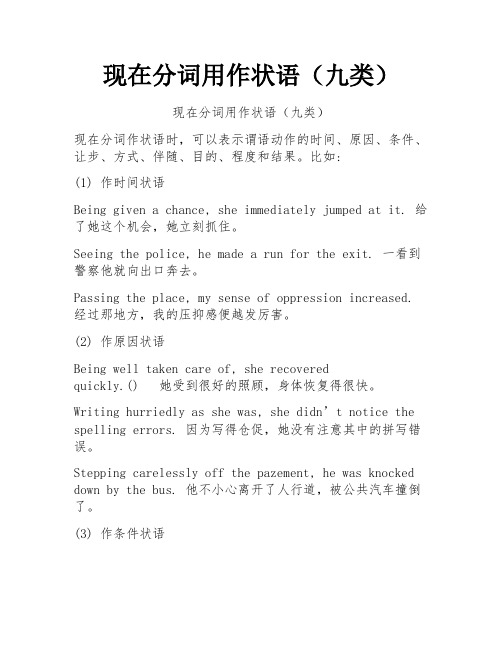
现在分词用作状语(九类)现在分词用作状语(九类)现在分词作状语时,可以表示谓语动作的时间、原因、条件、让步、方式、伴随、目的、程度和结果。
比如:(1) 作时间状语Being given a chance, she immediately jumped at it. 给了她这个机会,她立刻抓住。
Seeing the police, he made a run for the exit. 一看到警察他就向出口奔去。
Passing the place, my sense of oppression increased. 经过那地方,我的压抑感便越发厉害。
(2) 作原因状语Being well taken care of, she recoveredquickly.() 她受到很好的照顾,身体恢复得很快。
Writing hurriedly as she was, she didn’t notice the spelling errors. 因为写得仓促,她没有注意其中的拼写错误。
Stepping carelessly off the pazement, he was knocked down by the bus. 他不小心离开了人行道,被公共汽车撞倒了。
(3) 作条件状语Being advised to talk less, Mary keeps silent while we talk. 要是叫她少说点,当我们说话的时候,玛丽就会保持沉默。
It will take you half an hour to get to the station, allowing for traffic delays. 把路上的耽搁算进去,你要用半小时才能到车站。
Being defeated in every battle, the enemy will soon surrender. 要是敌人每场战斗都被打败,那他们就会投降。
现在分词短语作状语要点总结
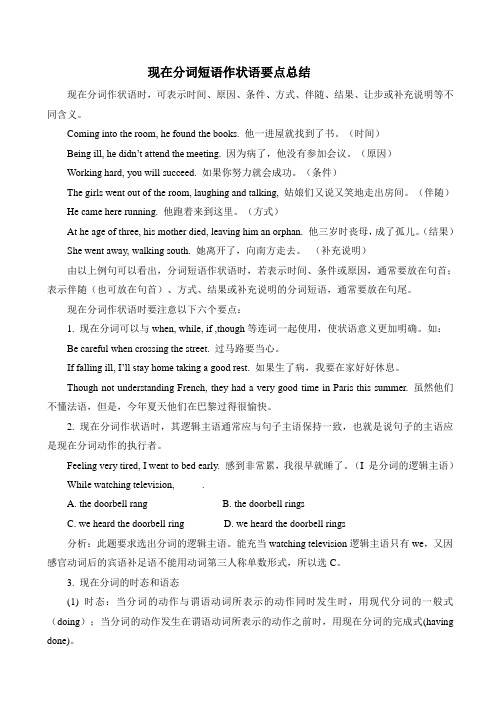
现在分词短语作状语要点总结现在分词作状语时,可表示时间、原因、条件、方式、伴随、结果、让步或补充说明等不同含义。
Coming into the room, he found the books. 他一进屋就找到了书。
(时间)Being ill, he didn’t attend the meeting. 因为病了,他没有参加会议。
(原因)Working hard, you will succeed. 如果你努力就会成功。
(条件)The girls went out of the room, laughing and talking, 姑娘们又说又笑地走出房间。
(伴随)He came here running. 他跑着来到这里。
(方式)At he age of three, his mother died, leaving him an orphan. 他三岁时丧母,成了孤儿。
(结果)She went away, walking south. 她离开了,向南方走去。
(补充说明)由以上例句可以看出,分词短语作状语时,若表示时间、条件或原因,通常要放在句首;表示伴随(也可放在句首)、方式、结果或补充说明的分词短语,通常要放在句尾。
现在分词作状语时要注意以下六个要点:1. 现在分词可以与when, while, if ,though等连词一起使用,使状语意义更加明确。
如:Be careful when crossing the street. 过马路要当心。
If falling ill, I’ll stay home taking a good rest. 如果生了病,我要在家好好休息。
Though not understanding French, they had a very good time in Paris this summer. 虽然他们不懂法语,但是,今年夏天他们在巴黎过得很愉快。
2. 现在分词作状语时,其逻辑主语通常应与句子主语保持一致,也就是说句子的主语应是现在分词动作的执行者。
- 1、下载文档前请自行甄别文档内容的完整性,平台不提供额外的编辑、内容补充、找答案等附加服务。
- 2、"仅部分预览"的文档,不可在线预览部分如存在完整性等问题,可反馈申请退款(可完整预览的文档不适用该条件!)。
- 3、如文档侵犯您的权益,请联系客服反馈,我们会尽快为您处理(人工客服工作时间:9:00-18:30)。
谓语动词: 有提示词, 句子缺谓语(与主语构成主谓结构)I. I _______ (tell) by my classmates about that.2. My mother often __________ (stop) me from watching TV.时态语态变化, 及主谓一致非谓语动词(主动---doing , 被动---done, 目的/结果/将要to do ,)1. We must also consider the reaction of the person __________ (receive) the gift.2. My pupils, Tom__________ (include), liked her.1. He entered, ________ (hold) a book in his hand.2. He entered the room and _______ (hold) a book in his hand.3. I politely refused her invitation and _____ (walk) away.4. I politely refused her invitation, ______ (walk) away.两个动词是同时发生的时候主语+ 谓语1 + and / but + 谓语2主语+ 谓语,+非谓语1. When he _______ (come) in, I was reading a book.2. Unless I ________ (invite), I won’t attend he party.3. When _____ (hear) the news, I was excited.4. Unless ____ (invite), I won’t attend he party.--- When / if / unless / /After/Before 等连词后没有主语+非谓语(--- ing /---ed ) , 主句---When / if / unless / /After /Before等连词+ 主语+ 谓语,主句1. A boy ________( call ) Jack came here today2. A boy who ________( call ) Jack came here today3. We enjoy the movie _________ (direct) by a world famous artist.4. We enjoy the movie which_________ (direct) by the world famous artist.名词后没关系词时+ 非谓语, 非谓语动词修饰前面的名词做定语名词后有关系词时+谓语,做定语从句中的谓语1.“You can’t catch me!” Jan et shouted, _______ (run) away.2.He said thanks and ____ (smile) a row of teeth.3.When first ___________ (introduce) to the market, these products enjoyed great success.4.When he_______( arrive ) at the corner , he met his friend.5.________ ( sleep ) late, he turned off the alarm clock.6.Don’t use words, expressions, or phrases _______(know) only to people with specificknowledge.[例1] I got on the bus and found a seat near the back, and then I noticed a man 18 (sit) at the front. (2011广东卷)[例2] He spit it out, __37___(say) it was awful. (2010广东卷)[例3]The fact that so many people still smoke in public places _______ that we may need a nationwide campaign to raise awareness of the risks of smoking.A. suggestB. suggestsC. suggestedD. suggestingturn1. If you _____to the left, you'll find the post office.2. _____ to the left, and you'll find the post office.3. to the left , you'll find the post office .[例4] She wished that he was as easy 32 (please)as her mother,who was always delighted with perfume.(2009广东卷)see(1)_______ from the top of the hill, our house looks like a car.(2)_______ the dog come over, our friend ran away.(3)_______ from the top of a hill, and you’ ll find the city more beautiful.(4)_______ more clearly, they came up and got close to it.1. When ____________ different cultures, we often pay attention only to the differences without noticing the similarities.2.__________ with other top students, you are better.discuss(1)The question _________________now at the meeting is very important.(2)The question ________ at the meeting last week is very important.(3)The question __________________ at the meeting next week is very important.1._____many times, but he still couldn't understand it.2. _____many times, he still couldn't understand it.A. Having been toldB. ToldC. He was toldD. To be told1.He is the best one ______ (do) the job.2.He was considered the first man _______________ (invent) the telephone.动词不定式的动作先于谓语动词的动作而发生用to have done1. in thought, he almost ran into the car in front of him. (lose)2. of playing football, he went back to the classroom. (tire)3. with difficulty, he rushed forward bravely. (face)有些过去分词源于系表结果,分词已经形容词化,相当于形容词be lost in; be interested in; be tired of; be satisfied with ; be excited about; be faced with; be dressed in;be seated1.He hurried to the booking office,only _____________ (tell) that all the tickets had beensold out.to do表示结果—表示出人预料的情况或结果, 常用only强调。
2.European football is played in 80 countries, ____________ (make) it the most popular sportin the world.分词表示结果包含着一种必然发生的结果。
His father died last year, (leave) him a large fortune.1. The flowers sweet in the garden attract the visitors to the beauty of nature.A. to smellB. smellingC. smeltD. to be smelt“闻起来很香”用来作定语修饰主语flowers。
感官动词没有被动。
v-ing作状语的分类☆一般来说,v-ing形式表示主动、进行;过去分词表示被动、完成。
☆-ing形式作状语,可以表示时间、原因、结果、条件、让步、行为方式、伴随状况等。
▲doing sth.作时间状语:﹡(see) my parents waving in the crowd,I went running to them.﹡(cross) the road, the old man was knocked over by a car.=When he (cross) the road, the old man was knocked over by a car.﹡When (hear) the news, he got frightened.= When he (hear) the news, he got frightened.﹡Having eaten his dinner, the boy (rush) out.﹡(hear) their teacher's voice, the pupils stopped talking at once.﹡(not receive) his letter, I decided to write another letter.▲doing sth.作原因状语:(be) a teacher,you should help your students in every way.(be) poor, he couldn’t afford a TV set.(not know) her address, I can't write to her.(live) with the girl for 5 years, we all know her very well.(eat) too much, he couldn’t go to sleep.▲doing sth.作结果状语:﹡There is mud and water everywhere, (make) it difficult to travel from place to place. 现在分词作结果状语表示一种必然性(自然结果)。
